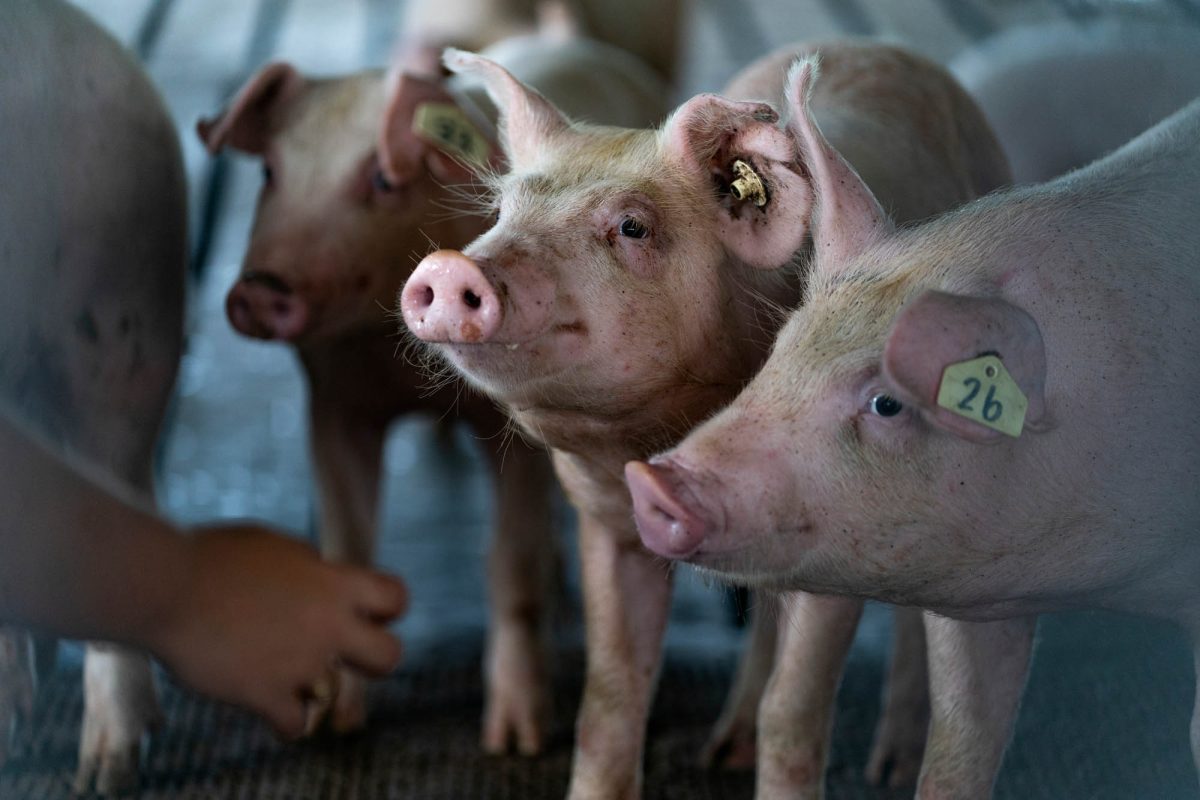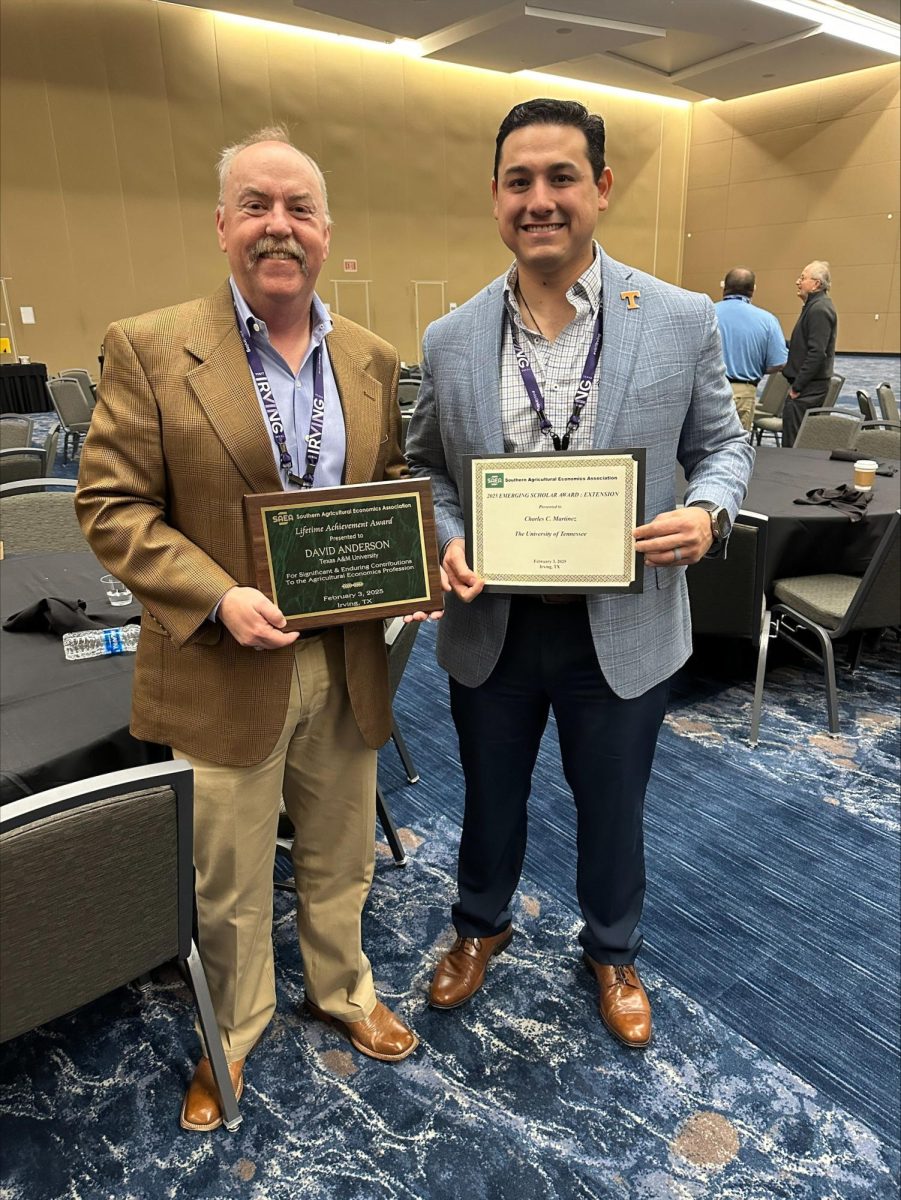She was holding it all together with a smile. As long as she kept her lips perfectly curved, they would never suspect a thing. They would never know the girl with the perfect life was dying by her own hand. They would never know the person they saw was not the same person she saw in the mirror.
I was living a double life, said Caitlyn Moore, a sophomore agriculture communications and journalism major. One was filled with this perfect girl who had the good grades, the boyfriend, the friends life was great. And then there was the other part of me who was crying herself to sleep every night and would spend nights throwing up in the toilet.
Eating disorders affect up to 24 million people in the U.S., especially among college-aged individuals. Students at colleges nationwide fight with their reflections in the mirror every morning, waging war with what they should look like.
Body image research
Marisol Perez, a professor in Texas A&Ms psychology department, focuses her research on eating disorders and body image. She said within American culture it is common, to a certain degree, for a woman to be dissatisfied with her physical body. Within the academic community this certain degree of dissatisfaction with ones self has been termed normative discontent.
Those with body image disorders experience a dissatisfaction that surpasses normative discontent.
When were working with individuals with body image issues or eating disorder issues, the goal is not to get them to zero, because thats not possible, Perez said. The goal is to get them to normative discontent.
Though the battle against negative body image is most impactful on a personal level, Perez said the problem exists on a societal level.
Our current society is contributing to women’s poor body image, Perez said. The weight loss, plastic surgery, pharmaceutical, cosmetic and media industries all profit from women being dissatisfied with the way they look. They are the ones driving the constant pressure to look a certain way.
Though both men and women are affected by the pressure to look a certain way, 85 to 95 percent of those struggling with an eating disorder are women. Perez said though the ideal male body is beginning to appear in the media, the ideal female has been an image that has been perpetuated for a far greater amount of time. Her research suggests this message is negatively impacting girls as young as four years old.
The female ideal has been around for a long time, Perez said. I think over time, its gotten more and more concrete.
Kristin Clemens, a psychologist with the Student Counseling Services on campus, coordinates the Eating Disorder Services. She said an implicit and false link between happiness and a certain body type is a very prevalent idea.
The media promotes the idea that we will be happy and successful if we fit a particular stereotype, Clemens said.
This implied connection between thinness and happiness is what first attracted Moore to her eating disorder in the fifth grade.
I remember being extremely self-conscious when I was in fifth grade, Moore said. I felt like everyone else was skinnier, prettier and smarter than me. I felt like I wasn’t good enough and my thoughts just got worse from there. I felt like an outsider and I thought that to be popular you had to be skinny. So thats what I did; I tried to get skinnier.
Moore said her freshman year was completely consumed by her eating disorder.
I came in my freshman year with the mindset, I can act on symptoms any time I want, Moore said. My freshman year was extremely difficult. I never went to classes and almost failed. I ended up in the ER twice because I had blacked out and stopped breathing.
Moore pushed her body to the limits by over-exercising.
I would cry myself to sleep every night and would have panic and anxiety attacks all the time. If you ask me about my freshman year, all I can tell you about is my eating disorder. I don’t remember anything else. I was isolated, miserable and dying.
Kate Fuller, senior recreation, parks and tourism sciences major, had also struggled with an eating disorder. She said she believed her eating disorder would bring her happiness, though in reality it was accomplishing the exact opposite.
Its not something that is going to make you happy, Fuller said. Its not worth the depression. Its not making you happy, its making you miserable and its hurting your friendships and your relationship with your family.
Recovery proved most difficult
Both Moore and Fuller fought their eating disorders aggressively through treatment, though it was by no means an easy battle. Fuller said her recovery process was the most difficult part of her journey.
You struggle with this mindset that, I need to be this way for so long that when its different and its not what you want it to be, its hard to accept that youre still valuable and youre still pretty, she said.
Moore confronted her eating disorder by entering into a residential treatment facility for a month.
I went to residential for one month and then did two months of outpatient work, Moore said. I went to countless therapy sessions. My entire summer consisted of treatment and therapy. I had to give up a lot of bad habits and completely change everything.
Fuller and Moore have found hope through their struggles. Moore said she is living life as a completely different person now that she has developed healthier habits.
I feel like a completely new person since I got out of treatment, Moore said. It’s like I’m living life for the first time. I realized how much I was missing out on now that I’m healthy. Now I can walk across campus without blacking out. I can eat in front of other people. I can have conversations without forgetting what I said. Recovery is an extremely long process, especially since I’ve struggled for so long. I think that one day I will be fully recovered.
Fuller said her recovery resulted in her own spiritual growth while also providing her the opportunity to share hope with others fighting the same battle.
My faith grew substantially. It had to, she said. I had to trust that the Lord was doing something. I just constantly found people crossing my path that struggled with the same thing.
On-campus resources
Resources are available on campus to those who are struggling with an eating disorder or their body image. Meghan Windham, the dietitian with Student Health Services, works to help students create a plan for a healthy diet and lifestyle.
My emphasis is always, Lets try to be healthy and focus on who you are, not necessarily what you look like, Windham said. Weve got to find that balance of being healthy but being comfortable with who you are, too.
Clemens said she assists students with creating a healthier idea of themselves as unique individuals.
I enjoy helping students develop a more holistic sense of their own identity, which is much deeper than the external image we project to others, Clemens said.
Students on campus can assist in creating a culture that encourages a more positive body image by focusing on qualities besides physical attributes. Perez said one way to do this is to refrain from engaging in fat talk.
Fat Talk describes all of the statements made in everyday conversation that reinforce the thin, ideal standard of female beauty and contribute to women’s dissatisfaction with their bodies, Perez said. Examples of fat talk may include: I’m so fat, Do I look fat in this? I need to lose 10 pounds, and She’s too fat to be wearing that swimsuit.
Perez said Fat Talk isnt always negative.
[It] can seem positive yet also reinforce the need to be thin: You look great have you lost weight?
Perez said in an academic setting, the focus should be placed on who people are and what they can become, not what they look like.
One of the things we want to push on college campuses is that we should really all be focusing on building leaders, not on building people who look pretty, Perez said.
Windham said it is important that students focus on positive qualities about themselves that are not necessarily physical.
Focus on your good qualities. For one, find something thats not body-related, Windham said. People ask, Whats your best quality? and not thinking, Oh, its my eyes, its my muscles, its my legs. Thinking outside the box there and focusing more on, is it personality? Is it, [Do] you like to serve others?
Moore said students should remember to be sensitive, because anyone could be hiding behind a smile.
Eating disorders are not a joke, Moore said. People don’t choose to have an eating disorder, but they do choose to recover. They are not something to make fun of. You want to see people with an eating disorder? Look around you, because it could be anyone. You never know whos struggling, so watch what you say. Eating disorders are serious illnesses and anyone who has one needs support and love. If you know someone who struggles, be there for them. Sometimes all you have to do is shut up and listen.
Miss-measured
January 17, 2013

0
Donate to The Battalion
$2790
$5000
Contributed
Our Goal
Your donation will support the student journalists of Texas A&M University - College Station. Your contribution will allow us to purchase equipment and cover our annual website hosting costs, in addition to paying freelance staffers for their work, travel costs for coverage and more!
More to Discover









